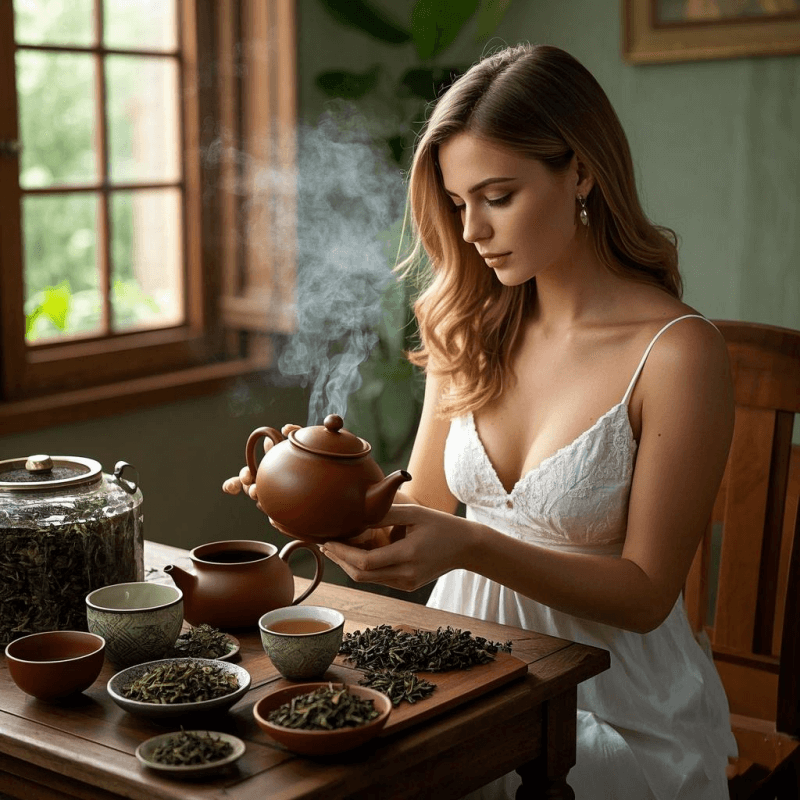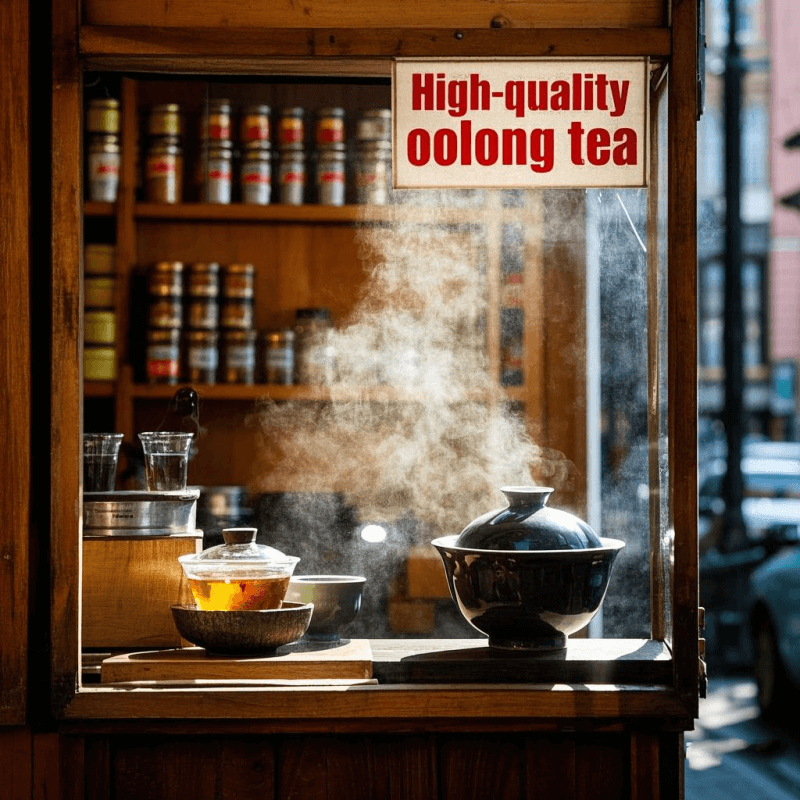
1. Introduction: Why Finding Quality Oolong Tea Near Me Matters
The search for “oolong tea near me” isn’t just about convenience—it’s about unlocking a sensory experience that mass-produced teas can’t match. Quality oolong tea, with its complex flavors and aromatic depth, requires precise processing and fresh ingredients. Whether you’re a seasoned tea drinker or new to this semi-fermented beverage, finding a local source ensures you get tea at its peak freshness. A study by The Tea Association of the USA found that 72% of tea enthusiasts prioritize freshness when purchasing, making “oolong tea near me” a top search for those who refuse to compromise on quality.
2. What Makes an Oolong Tea “Quality”?
True quality oolong tea shares these defining characteristics:
1. Origin & Terroir
- Premium oolongs often come from specific regions like Taiwan’s high mountains, Fujian’s Wuyi Mountains, or Guangdong’s Phoenix Mountains. The soil, altitude, and climate in these areas impart unique flavor notes. For example, Taiwanese high mountain oolongs are known for their floral brightness, while Wuyi rock oolongs offer bold, mineral-rich profiles.
2. Harvest & Processing
- Handpicked leaves from the first spring flush (March-April) yield the most delicate flavors.
- Traditional processing steps like sun-withering, hand-rolling, and controlled oxidation (10-70%) are critical. Mass-produced teas often skip these steps, resulting in flat flavors.
3. Visual & Aromatic Signals
- Whole, intact leaves (not broken or dusty) that unfurl gracefully when steeped.
- A dry aroma that’s fresh and complex—think orchids, roasted nuts, or ripe fruit—without artificial scents.
3. Local Places to Find Oolong Tea Near Me (Shops, Markets, Cafés)
When searching for “oolong tea near me,” these local spots offer the highest quality:
Specialty Tea Shops

- Chinatown Tea Houses: Areas like San Francisco’s Chinatown or New York’s Flushing neighborhood host family-run shops that import directly from Taiwan and China. Look for signs like “traditional oolong tea” or ask if they carry single-origin varieties.
- Artisanal Tea Boutiques: Stores like Teance in Berkeley or The Tao of Tea in Portland curate small-batch oolongs. Many offer tastings, so you can try before buying. Pro tip: Ask if they source from organic farms—brands like Yunnan Sourcing prioritize sustainability.
Farmers Markets & Local Fairs
- Weekend markets often feature local tea growers. For example, the Ferry Plaza Farmers Market in San Francisco occasionally has vendors selling California-grown oolong tea. While rare, these teas showcase how climate affects flavor.
- Asian markets like H-Mart or 99 Ranch carry budget-friendly oolongs, but focus on brands with clear origin labels (e.g., Tie Guan Yin from Anxi, Fujian).
Tea Cafés & Gongfu Tea Houses
- Places like Boba Guys (in select cities) or traditional gongfu tea houses offer high-quality oolong tea near me for immediate enjoyment. Many also sell loose leaves to take home. A barista at New York’s Cha An explained, “We steep our Wuyi oolong in Yixing clay pots to bring out its rocky sweetness—customers often buy the same tea after tasting it here.”
4. Online Options When Local Stores Don’t Have What You Want
When your search for “oolong tea near me” comes up short, these online sources deliver quality:
Specialty Tea Websites
- YIHE Teas: Their oolong tea collection includes rare single-bush oolongs and traditional roasted varieties. Discover the subtle beauty of oolong tea with our premium leaves sourced from heritage farms.
- Upton Tea Imports: Offers detailed origin notes and processing methods, ideal for tea nerds. Their Dan Cong oolong selection is particularly impressive.
Amazon & Etsy
- Look for small brands with 4.5+ star ratings and reviews mentioning “fresh leaves” or “multiple steeps.” Examples include Mountain Stream Teas (Taiwanese oolongs) and TeaVana’s limited-edition collections.
- Etsy sellers like TeaHausNYC often package teas in eco-friendly tins, making them great gifts.
Brand Direct-to-Consumer
- Brands like Tazo or Twinings have reliable basics, but for premium options, check out:
- Yunomi: Specializes in Japanese and Chinese teas, with detailed brewing guides.
- Yakushima Tea: Their Taiwanese High Mountain oolong is sustainably grown at 3,000+ feet.
5. How to Tell If the Oolong Tea You Found Is Authentic
Use these expert techniques to verify quality:
1. Visual Inspection
- Dry Leaves: Whole leaves should be twisted or rolled (not crushed). Light oolongs like Tie Guan Yin are greenish-brown, while roasted oolongs appear darker.
- Brewed Leaves: After steeping, leaves should be intact and vibrant, not mushy or discolored. A Healthline article on tea quality notes that damaged leaves often indicate low-grade processing.
2. Aroma Test
- Dry Aroma: Stick your nose in the bag—genuine oolong smells fresh, like flowers, fruit, or toasted nuts. Avoid teas with harsh, chemical-like scents.
- Wet Aroma: After the first steep, the aroma should be complex and inviting, not stale or grassy.
3. Flavor & Mouthfeel
- First Steep: Flavor should be balanced, not bitter or overly astringent. Light oolongs taste bright and refreshing; dark oolongs are richer and more full-bodied.
- Multiple Infusions: Quality oolong tea can be steeped 5-7 times. Each steep should reveal new layers, from floral to nutty notes. If it tastes flat after two steeps, it’s likely low-quality.
6. Expert Tips to Buy the Best Oolong Tea Near You
Follow these strategies from tea sommelier Lisa Tan:
Ask the Right Questions
- Where was this tea grown? Specific regions (e.g., Alishan, Taiwan) signal higher quality.
- When was it harvested? Fresh oolong tea near me was likely harvested within the past 6-12 months.
- How was it processed? Traditional methods like charcoal roasting add depth but cost more.
Start with Small Batches
- Buy 25-50g first to test flavor. This prevents wasting money on large tins of tea you might not like.
Invest in Proper Tools
- A gaiwan or Yixing clay pot enhances oolong’s aroma. Elevate your tea experience with authentic oolong teaware that retains heat and releases flavors gradually.
Join Tea Communities
- Facebook groups like “Oolong Tea Enthusiasts” or Reddit’s r/tea share local recommendations. One member in Chicago said, “I found my favorite Wuyi oolong at a hidden shop in Chinatown—only locals know about it!”
7. Conclusion: Start Exploring Quality Oolong Tea Near Me Today
The search for “quality oolong tea near me” is a journey worth taking. Whether you find it in a bustling Chinatown shop or a quiet artisanal boutique, the reward is a cup of tea that reflects months of careful cultivation and craftsmanship. Remember: fresh, properly processed oolong tea not only tastes better but also offers health benefits like antioxidants and stress relief.
Ready to discover your new favorite? Browse our oolong tea collection for every taste preference—from light, floral Taiwanese oolongs to bold, roasted Wuyi varieties. And when you’re ready to perfect your brew, savor the taste of oolong tea with traditional brewing tools that bring out its full potential. Your local tea adventure starts now.

Pingback: Where to Buy Oolong Tea: Top Sources for Fresh, Authentic Brews